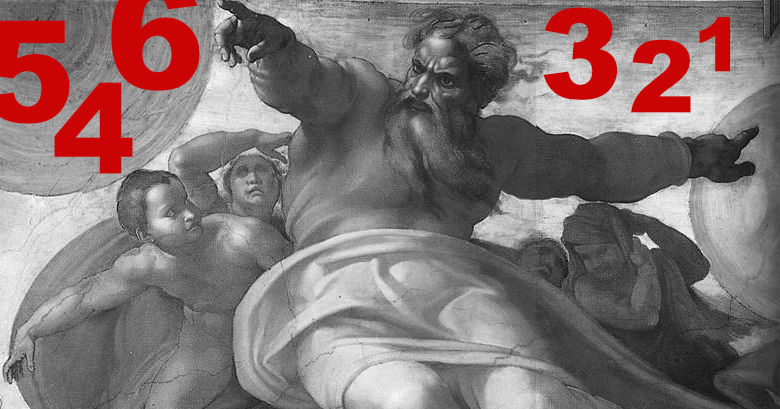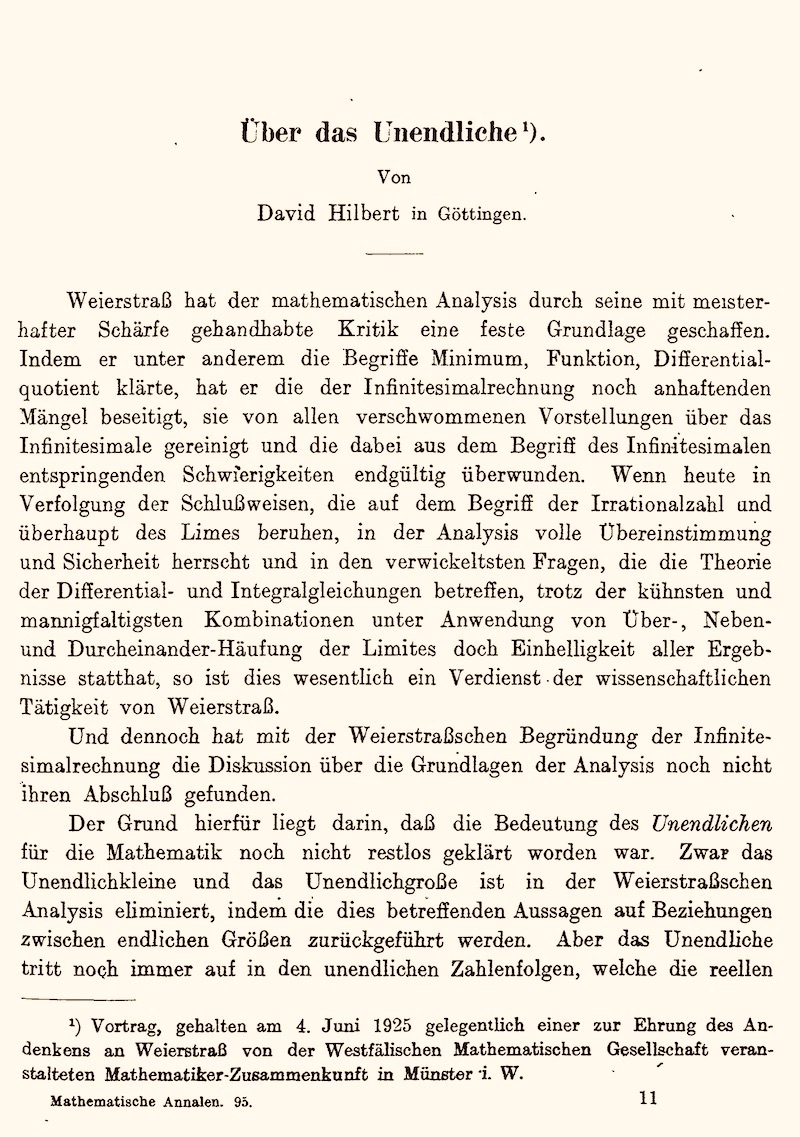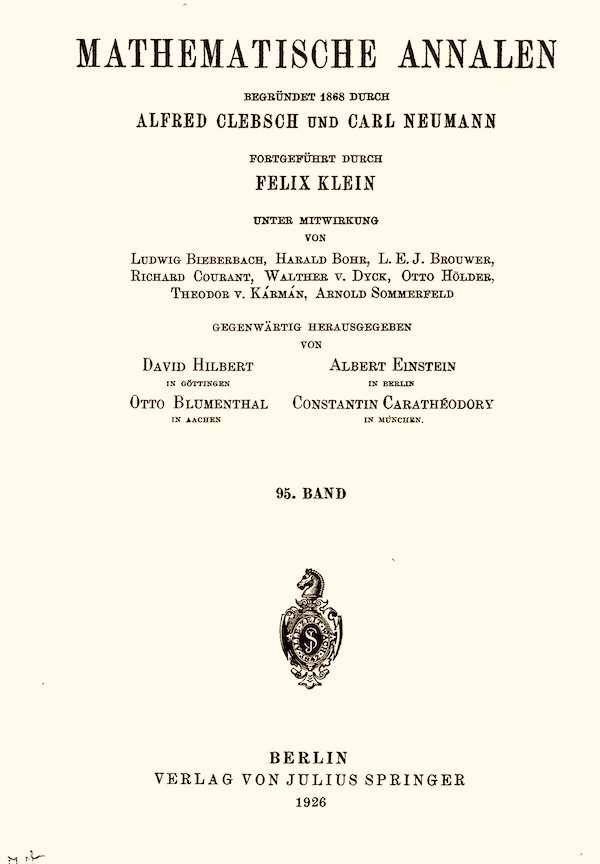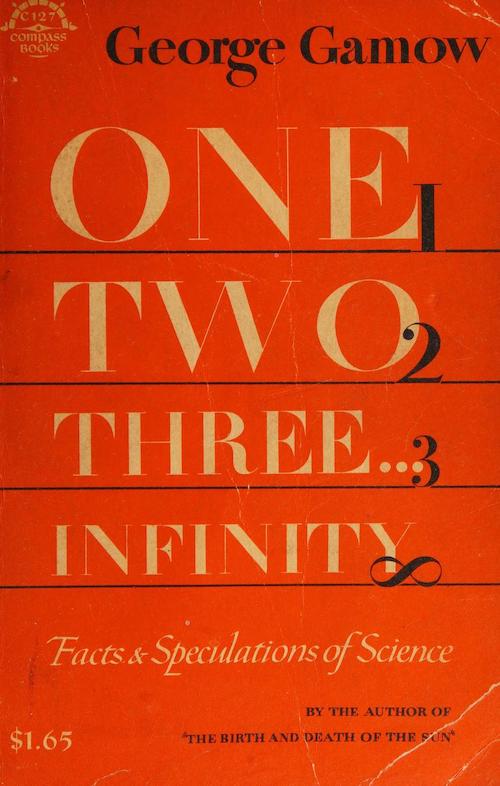| HPS 0628 | Paradox | |
Back to doc list
Paradoxes of the Infinitely Large
John D. Norton
Department of History and Philosophy of Science
University of Pittsburgh
http://www.pitt.edu/~jdnorton
Supertasks produce problems when we consider the results of completing an infinity of actions. We can go one step deeper into infinity and still find paradoxes. They arise when we simply consider an infinite collection of anything. We shall see in the next chapter that a resolution of the paradoxes lies at the foundation of modern set theory. There we will find a fascinating and unexpected account of infinitely large collections.
The contemplation of an infinity has produced a wide range of paradoxes. On closer inspection, many turn out to be clever retellings of just one paradox. The classic version in the literature is the "Hilbert Hotel." We are to imagine a hotel with infinitely many rooms. They are all occupied.
All is well and the hotel manager is happy. But
then...
A new guest arrives and seeks a room. What can the manager do? All the rooms are full!
The inventive hotel manager has a scheme for making space. He asks each of the guests in the presently occupied rooms to move up one room.
The guest in room 1 moves to room 2;
the guest in room 2 moves to room 3;
and so on for all the guests.
Room 1 is now empty and available for the new guest.
Next, a bus of tourists arrives with 10 guests, each seeking a room. The manager can find space for them as follows:
The guest in room 1
moves to room 11;
the guest in room 2 moves to room 12;
the guest in room 3 moves to room 13;
and so on for all the guests.
Rooms 1 to 10 are now empty for the new guests.
Next door to the Hilbert hotel is the Bernays hotel, also with infinitely many rooms, all filled. A fire alarm forces all these infinitely many guests to evacuate the hotel and seek rooms next door in the Hilbert hotel. Once again the manager can find space for them as follows.
The guest in room 1 moves to room 2;
the guest in room 2 moves to room 4;
the guest in room 3 moves to room 6;
and so on for all the guests.
The infinitely many odd numbered rooms, 1, 3, 5, 7, ... are now empty and available for the infinitely many new guests.
The capacity of the Hilbert hotel to accommodate new guests has scarcely been touched. The manager can move the guests around so that there is always an occupied room surrounded by any number of empty room, no matter how large. For example, the manager might move the guests around as follows:
The guest in room 1 moves to room 101
= 10;
the guest in room 2 moves to room 102
= 100;
the guest in room 3 moves to room 103 = 1000;
and so on for all the guests.
There are now stretches of empty rooms of arbitrarily great length.
Imagine a new guest arrives who demands absolute quiet. If that guest demands at least 100 empty rooms on either side of the guest's room, the manager can put this troublesome guest in room 500. The nearest rooms are room 100 and room 1000. It does not matter how isolated the new guest would like to be, the manager can always accommodate the new guest by moving the guest to a room with a high enough number.
The Hilbert hotel, in my view and in the view of a mainstream of mathematics is not a true paradox in the sense of one that is reveals a deep contradiction in our conceptions. It is merely an appearance of such a problem. It requires us to reconfigure our default understanding of infinity. Much of what follows implements that reconfiguration.

However for a minority view in mathematics, matters are otherwise. This minority view is not to be dismissed lightly, since it is held by some distinguished mathematicians. The dissenting view falls under the rather loose banner of "finitism." There are many versions of it. What unites them is a distaste for the actual infinities (as opposed to potential infinities), that are so readily embraced in the Hilbert hotel and other related analyses. Even Hilbert himself seems to have had some sympathies for a version of finitism. To say more goes well beyond what can be responsively covered here. If the view has a rallying cry, it might be Leopold Kronecker's 1886:
"Dear God made the whole numbers; everything else is the work of man."
The original version of the Hilbert hotel paradox was presented by David Hilbert in lectures "On the Infinite" in Goettingen in Germany in 1924. Hilbert was then the leading mathematician of the early 20th century. He set the agenda for research in many areas of mathematics in the years following. To include the hotel in his lecture was to communicate it to a group that would become the leading mathematical thinkers of the coming decades.

David Hilbert
However the text of Hilbert's lecture containing the hotel was not published in his lifetime. It did NOT appear, for example, in the widely read text of a 1925 lecture, published in 1926: "Über das Unendliche" ["On the Infinite"]:


The first widely noticed publication of the Hilbert hotel came in George Gamow's wildly popular volume of 1947 One, Two, Three ... Infinity.

This led to speculation that perhaps Hilbert had not originated the hotel, but that it was really Gamow. This speculation was definitively laid to rest with the publication of Hilbert's lectures cited above. The original text was:
"We now assume that the hotel has infinitely many rooms numbered 1, 2, 3, 4, 5, … and that each of the rooms is occupied by a single guest. All that the manager has to do in order to accommodate a new guest is to make sure that each of the old guests moves to a new room with the number one unit larger. In this way room 1 becomes available for the new guest. One can of course make room for any finite number of new guests in the same manner; and thus, in a world with an infinite number of houses and occupants there will be no homeless."
Hilbert's text continued with a variation concerning dancers at a party:
"The
situation is the same with an infinite dance party where all the gentlemen
have asked the ladies to dance. A new lady enters, but the organizer of
the dance can easily arrange that she will not be without a partner. It is
even possible to get space for an infinite number of new guests,
respectively ladies [that is: partners for an infinite number of new
ladies on the dance floor]. One could, for example, ask the old guest who
originally occupied room number n to move to room number 2n. In this way
infinitely many rooms with odd numbers would be left free for new guests."
To see the situation envisaged by Hilbert, imagine an infinite dance party of Hilbert's time. It might have looked looked something like this:
A new lady joins the party:
To make room, each of the ladies is shifted along by one, opening a space:
The new lady now has a partner.
What if infinitely many ladies arrive, each seeking a partner?
Once again, we can rearrange the dancers to
accommodate them. If we number the ladies as 1, 2, 3, ... :
number 1 moves to position 2
number 2 moves to position 4
number 3 moves to position 6
etc.
Each of the infinitely many newcomers now has a partner.
We can now return to the paradox of the expanding universe described in earlier chapters. In modern big bang cosmology the collection of galaxies forming the matter of the universe is everywhere expanding and thus everywhere diluting. How can we have such a dilution everywhere if matter is conserved? Should not a dilution in one part of space be accompanied by a concentration of matter in another?
The earlier chapter sketched one solution. In relativistic cosmologies, space itself is expanding. That is, more space is created to fill the gaps between the galaxies. This happens everywhere and thus the matter of the universe is everywhere diluted.
However this same universal dilution can also arise in non-relativistic, Newtonian cosmologies. In them, the matter distributed in the galaxies can still expand and dilute everywhere. Space remains absolute and unaffected. The expansion of the galaxies is simply a motion of recession within a fixed absolute space.
The mechanism that enables this expansion everywhere is the one just seen in the Hilbert hotel. It depends essentially on space being infinite. A simple way to see it is to look at just one dimension of space in an expanding Newtonian cosmology. For simplicity, we will divide space along this one dimension into huge blocks. Each contains one galaxy. The uniform, universal motion of expansion leads the galaxies to spread apart. Intervening blocks of space are vacated in just the same way as the moving of guests in the Hilbert hotel leads to empty rooms between them throughout the hotel.
This same mechanism can manifest as a creative process. To see it, consider what might happen in the modern world of electronic banking if we could somehow open up an infinity of bank accounts. Let us number them 1, 2, 3, ... In this banking system, we are allowed a small, temporary overdraft on each account, as long as the overdraft is settled soon after it is taken. That is, each account can stray into a negative (red) balance, as long as we soon repay the overdraft amount and return the account to a zero balance or better.
Now consider the following infinite set of transactions. We set them up electronically and ask the bank's computer system to execute them all at once:
$1 is deposited into account 1, supplied by taking
an overdraft of $1 on account 2.
Account 2 is replenished by a $1 deposit, supplied by taking at overdraft
of $1 on account 3.
Account 3 is replenished by a $1 deposit, supplied by taking at overdraft
of $1 on account 4.
Account 4 is replenished by a $1 deposit, supplied by taking at overdraft
of $1 on account 5.
Account 5 is replenished by a $1 deposit, supplied by taking at overdraft
of $1 on account 6.
And so on for all infinity of the accounts.
The overall effect is that we start with nothing in any of the accounts. At the end of the process, we have a net gain of $1. If we are greedy, we could make the same transaction set many times; or just make the transaction once with, say, $1000.
The key element that enables this creative process is infinity. Each individual transaction conserves money. Nothing unexpected happens in each when viewed in isolation. Even finitely many of them behave well, no matter how many such individual transactions we consider. Ten, a hundred, a million, ... It is only when we consider infinitely many of them that the creative process is realized.
In the banker's paradox, we create money from nothing. This creation from nothing mechanism is the same one that played out in the reversed slow-speed supertask of the earlier chapter. We started with an infinity of bodies all at rest. None has any momentum or any kinetic energy. At the end of the supertask, the first body has acquired some kinetic energy and momentum. All the other bodies are at rest and have neither.
Analogously to the banker's paradox:
This first body borrowed
momentum and kinetic energy from the second body.
The second body borrowed momentum and kinetic energy from the third body.
The third body borrowed momentum and kinetic energy from the fourth body.
And no on for all infinity of the bodies
The net effect is that first ejected body gains energy, while all the remaining bodies that supplied energy are restored to their zero energy condition by an energy contribution from the next body in the sequence.
If the first body gains energy E, this figure shows more clearly the analogy to the banker's paradox:
In both cases, the infinity of the bank accounts and the infinity of bodies is essential. If there were only finitely many of each, then there would be a last bank account or a last body in the sequence of transfers. In the banker's paradox, there would be no further accounts to remove the overdraft. Any gain made in one account would be offset by an enduring overdraft in others. Similarly, in the slow-speed supertask, there would be no further body to supply the needed momentum and kinetic energy. Any gain in energy or positive momentum by the ejected body would be offset by a negative energy and negative momentum in other bodies.
Here's how things might end in the case of finitely many colliding bodies:
The ejected body could accrue energy E,
only if some other bodies could somehow adopt a negative energy state. In
the figure, the last body in the finite set of four bodies adopts energy
state -E.
There is no violation of conservation of energy since
Total energy at start = 0
Total energy at end = E
+ -E
= 0.
---oOo---
These examples of the paradoxes of the infinitely large are just a few of many possible instantiations of what is, in the end, just the one paradox. Other well know examples include Bertrand Russell's quaint example of Tristram Shandy. Shandy is an obsessive autobiographer. He takes one year to write the detailed account of one day in his life. For mortals with a finite life span, an autobiography such as this can never be completed. However, if Shandy were to live forever, would matters be otherwise? Would there be any day in Shandy's life that is not included in his autobiography?
| My life Day 1 |
My life Day 2 |
My life Day 3 |
My life Day 4 |
My life Day 5 |
My life Day 6 |
... |
| written in Year 1 |
written in Year 2 |
written in Year 3 |
written in Year 4 |
written in Year 5 |
written in Year 6 |
... |
Examples such as these fueled suspicion of infinities for a long time. Are these paradoxes sufficient in the end to preclude infinities from serious analysis?
Would there be any day in Shandy's life that is not included in his autobiography?
June 22, September
22, 2021. February 7, 2023.
Copyright, John D. Norton